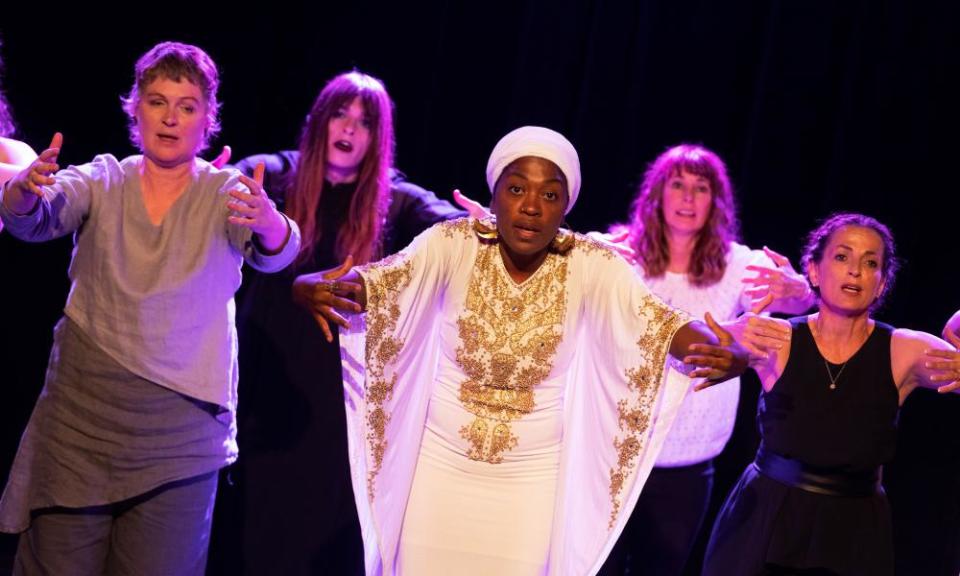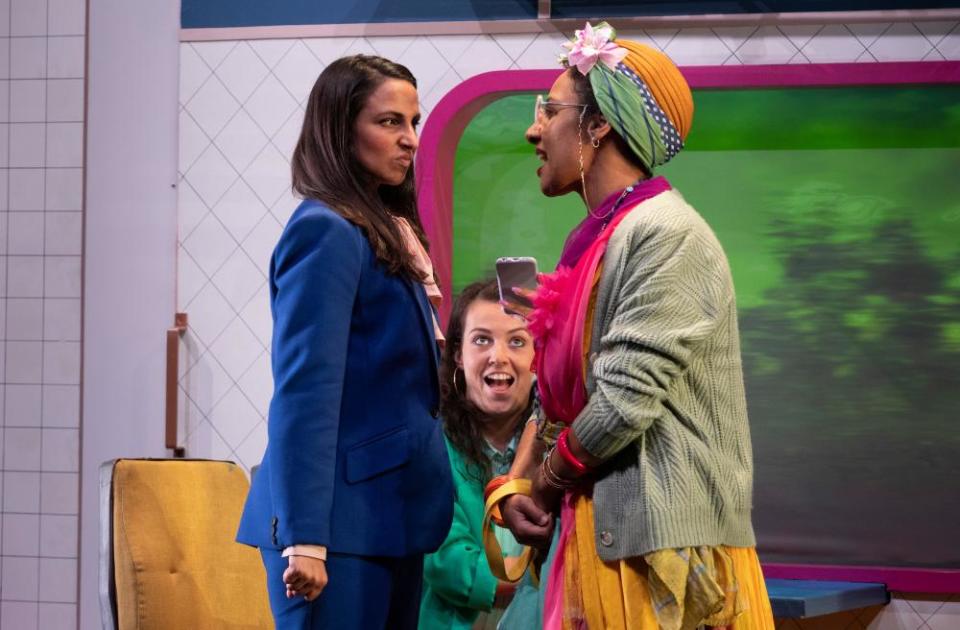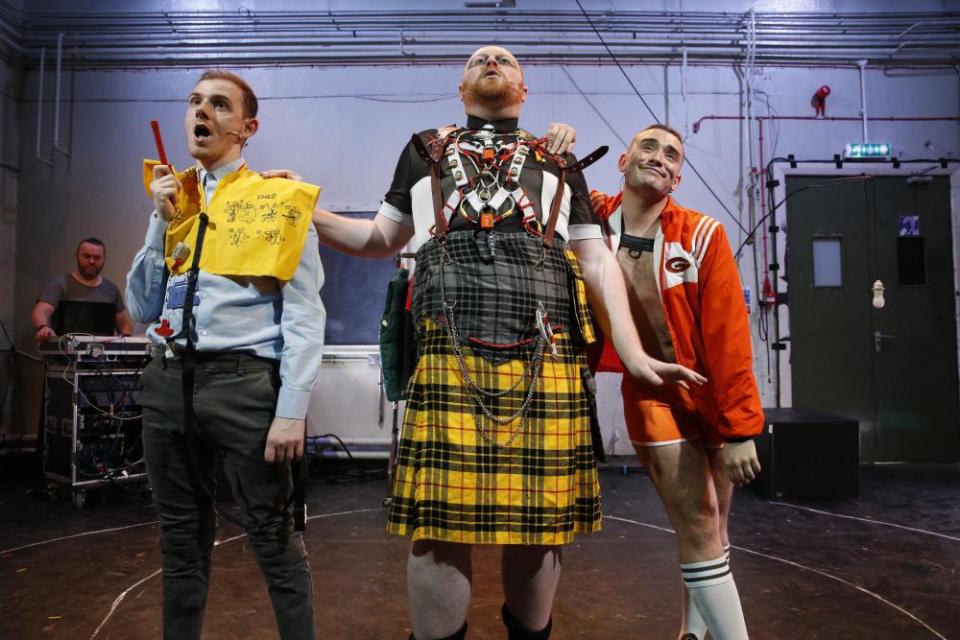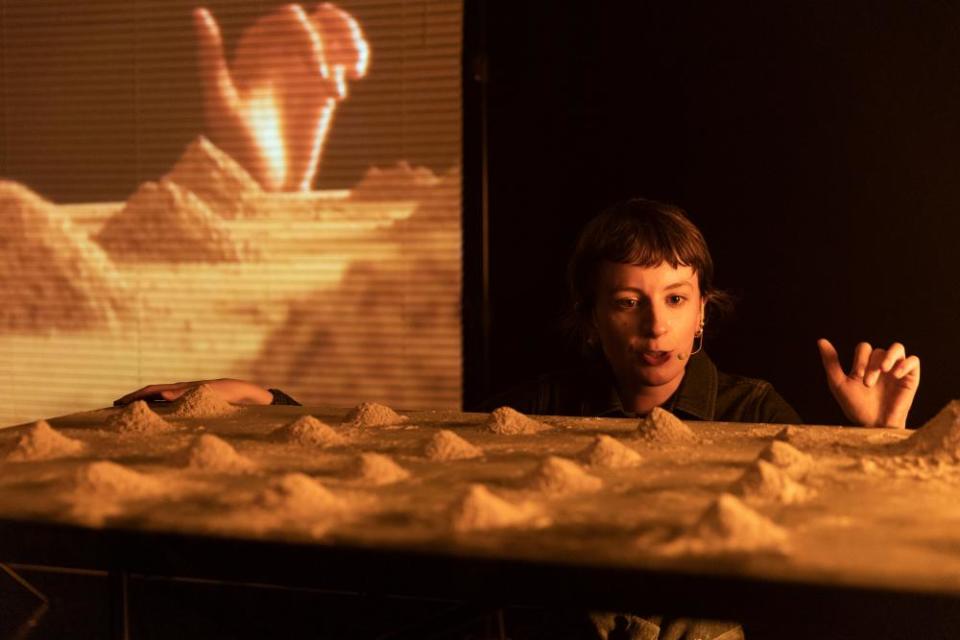Edinburgh fringe 2022 week one roundup: from care home tales to a Berlin fetish night

Day five of the festival. My friend Ani is stretched out, comatose, on a yellow beanbag outside the Pleasance Dome. This is her first fringe and we’re packing as much in to her 24-hour visit as we can. That’s not enough time of course, “but at least that last comic exposed her breast”, I reassure her later on. “It’s not a true fringe until there’s nudity involved.”
Day two of the festival. A fellow journalist and I are crouched on the stairwell in Summerhall’s loading bay, comparing notes. “How many times can you call the festival ‘weird and wonderful’ before the words cease to have all meaning?” she asks.
There’s the wild, decadent fringe, with its arcane rituals and its comedy acts sweating out their body fluids in airless dungeons. Then there’s the fringe-as-industry, which looms larger than usual this year, its first full-throated return since the festivals were cancelled in 2020. We’ve finally graduated from paper tickets – but there’s still no booking app. Artists are speaking more openly about the barriers to participating in the world’s largest open-access festival and the toll this month-long grind extracts upon their health and finances.

But hey: who wants to be that person at the party? As someone who lives in Edinburgh and works in the arts, it feels traitorous to feel entirely pessimistic at the fringe’s return. The sun is shining, the streets are packed. The Belgian waffle truck in George Square is back! God, I love those waffles, just as I love sitting in the back of Assembly Studio One at two in the afternoon, weeping a little as eight women from different parts of the world sing a traditional Yoruba chant. I’d initially approached She/Her (Assembly George Square Studios, ★★★) with some trepidation; given the current “war on woke”, pronouns have unfortunately become deeply contested territory. I shouldn’t have worried. Created by Nicole Ansari-Cox and produced by her husband, Succession star Brian Cox, the show is a loving, expansive proof of practice in shared vulnerability. Exploring themes of addiction, parenthood, queerness and power, She/Her’s monologues brim with generosity in their form and content: if you cannot speak who you are, sing it. If you feel pinned to the ground, let me unburden you.
Solidarity also features in James Ley’s celebratory Ode to Joy (How Gordon Got to Go to the Nasty Pig Party) (Summerhall, ★★★★): a raucous, cum-stained love letter to friendship, literal arseholes and the European Union. Fearful of being spooned into submission by “Prince Charming types”, strait-laced Scottish government employee Gordon heads to Berlin to attend Berghain’s infamous fetish night Snax, accompanied by his occasional lover Cumpig, and Cumpig’s husband, Manpussy. It’s a big, blurry mess of a show – the way the best nights are – set to staccato booms and the enthusiastic consent of its audience. Virus? What virus? Let’s dance, baby!

Down in England, things are looking much more dire. In Exodus (Traverse, ★★★★), home secretary Asiya Rao and her senior adviser-slash-handler Phoebe are in Dover for a photo op that will launch Asiya’s new scheme to end Channel crossings – and, hopefully, her campaign for the top job at Westminster. But when a baby washes up onshore, they panic, pop the infant into Asiya’s handbag, and embark on a white-knuckled train ride back to London, complete with fake mothers, gnawed-off nipples and defenestration.
A hysterical farce that’s chock-full of deus ex machinas, this National Theatre of Scotland production steers the UK’s current far-right messaging to its natural, nonsensical conclusion and gives it a push over the chalk cliffs. Sophie Steer as Phoebe is particularly commanding; Habiba Saleh as Haben, the asylum seeker turned thespian accomplice, is less convincing, though I suspect this is a consequence of Exodus’s greater preoccupation with the absurdity of political theatre than with the victims of its theatrics.

The kind of power that preoccupies Move Fast and Break Things (Summerhall, ★★★) is similarly destructive, but its operations are less visible. The two-hander centres on a couple who are attempting to create a play about Amit Patel, Google’s shadowy employee No 7, who has been credited with coining the company’s early motto, “don’t be evil”, as well as discovering the patterns in our behavioural data that created the foundations for targeted ads.
Dextrous camera work, finger puppetry and shadow play are overlaid with the vibe of a true crime podcast, as Freight theatre constructs a digital underworld that undergirds our experience of reality itself. The two sides of the show don’t always hang together perfectly – the couple’s deteriorating relationship sometimes threatens to draw attention away from the intrigue of their search – but Move Fast is certainly prescient enough to ask questions around knowledge and control in the digital age that we might not yet be prepared to ask, much less fully understand.
The first few minutes of Ian McKellen’s highly anticipated new Hamlet (Ashton Hall, ★★) leave me in a state of different, but equal disorientation. Peter Schaufuss’s production splits the Prince of Denmark in two, with McKellen as his mouthpiece and Johan Christensen embodying his balletic self. The rest of the cast is made up of dancers, who do an excellent job at summing up most of the plot in a few elegant leg-lifts. And indeed, if only one man should ever speak, then of course it ought to be McKellen, who delivers the play’s greatest-hit soliloquies with his usual sonority.
But the question that dogs every minute of this condensed retelling is: why? Why is this happening? Having an older Hamlet play opposite a leaping, virile version of himself could have said something interesting about the juxtaposition of youth and age, impetuous aggression and wise cunning – but that never happens. Instead, having two Hamlets on stage together ultimately deprives the tragedy of its central thrust: of how grief isolates and ravages the minds of its victims. Robbing Hamlet of his solitude defangs the story and the resulting production, while very pretty indeed, is left a hollow imitation.
Are the kids all right? The prognosis is uncertain in Dipo Baruwa-Etti’s Half-Empty Glasses (Roundabout @ Summerhall, ★★), a Paines Plough production that attempts a similar reckoning with the past. Young Toye is on track to win a prestigious music scholarship when,, unsatisfied by brief mentions of Martin Luther King in history classes, he is emboldened to take his education into his own hands and raise awareness around black historical figures at his school. The issues that Toye and his friends are trying to redress and navigate their way through are very real – they themselves are much less convincing.
Rather than telling the story of young people coming into full awareness of the racist systems that will shape their destiny, Half-Empty Glasses feels like an earnest pantomime of activism, packed with awkward half-rhymes, frustrating schoolyard diatribes and shoehorned pedagogical studies. Ultimately, I left the Roundabout tent in Summerhall feeling much more invested in the life and work of Britain’s first black female publisher, Margaret Busby, than I did in Toye, Ash and Remy; maybe that’s not a bad thing.

If you’ve ever loved and wanted the best for an elderly person, you would want them to be taken care of by Bilal Zafar, even if it meant them becoming material for his standup comedy. Soon after obtaining his degree, Bilal embarked on a short career as a carer in a private care home. His new show, Care (Underbelly. ★★★), makes gentle fun of its elderly residents, highlighting their eccentricities, their pettiness, their feuds over giant Scrabble. He brilliantly conjures the difficult job of caring for others, particularly in their twilight years, the patience and compassion it requires to bring comfort and dignity to others and the exploitative conditions many care workers currently face.
Another strong standup show asks: what do you do when an intruder tries to break into your home? You stuff an oven-ready lasagne into your bag and get the hell outta Dodge, that’s what. But American standup – and fringe debutante – Atsuko Okatsuka (Pleasance Courtyard, ★★★★) isn’t going to give up without a fight and, in an expertly woven hour, explains how life has endowed her with a very particular set of skills for fending off home invaders. By balancing her present danger with musings on whether mental health conditions should be renamed after theme park rides, Atsuko manages the tricky push-pull of comedic tension with thrilling ease. Despite her insistence that she’s not cut out for real life, she’s immediately someone you want in your corner. Just don’t ask her whether she skates.
I’ll just hold up my hands now and say this: I didn’t know who Sheeps were and therefore fully expected much of their retrospective show Sheeps: 10 Years, 10 Laughs (Pleasance Courtyard, ★★★) (it’s actually been 12 years) to go over my head. What I got instead was an entirely affable hour of watching three pals larking about on stage, still clearly at the top of their game and with plenty more meta-nonsense to spout. And yet earnestness cannot help but shine through in their final sketch, Three Cowboys on the Range, which serves as a touching ode to the trio’s unique alchemy and the enduring quality of their friendship. One advance ticket to their future musical three-hander, please.

On day four of the festival, I’m visibly sweating in the audience of Work.txt (Summerhall, ★★★★★), a play that bills itself as a “show without actors”. The plot, if there is one, revolves around a social media manager who lies down on the floor of his office lobby one morning, creating a stir across a city that nonetheless plunges relentlessly towards higher productivity and conversion rates. The rest of the action is created by us, the audience, with a script projected on to a screen. In a global economy that feels increasingly atomised and exploitative, which seems to place value in all the wrong places and pockets, what do we do? How should we spend our days?
Who can say – at the very least, Work.txt has some ideas on how we might spend an hour together. As we sing My Heart Will Go On in unison and the printer on the floor gains sudden sentience, I suddenly think: God, but I do love this. As we stack up our yellow blocks just to see them get knocked down again, I think: yes, we can build them back better! Things can always be made better if they’re meaningful and worthy of our labour and our attention. Long live the fringe.

 Yahoo Movies
Yahoo Movies 
